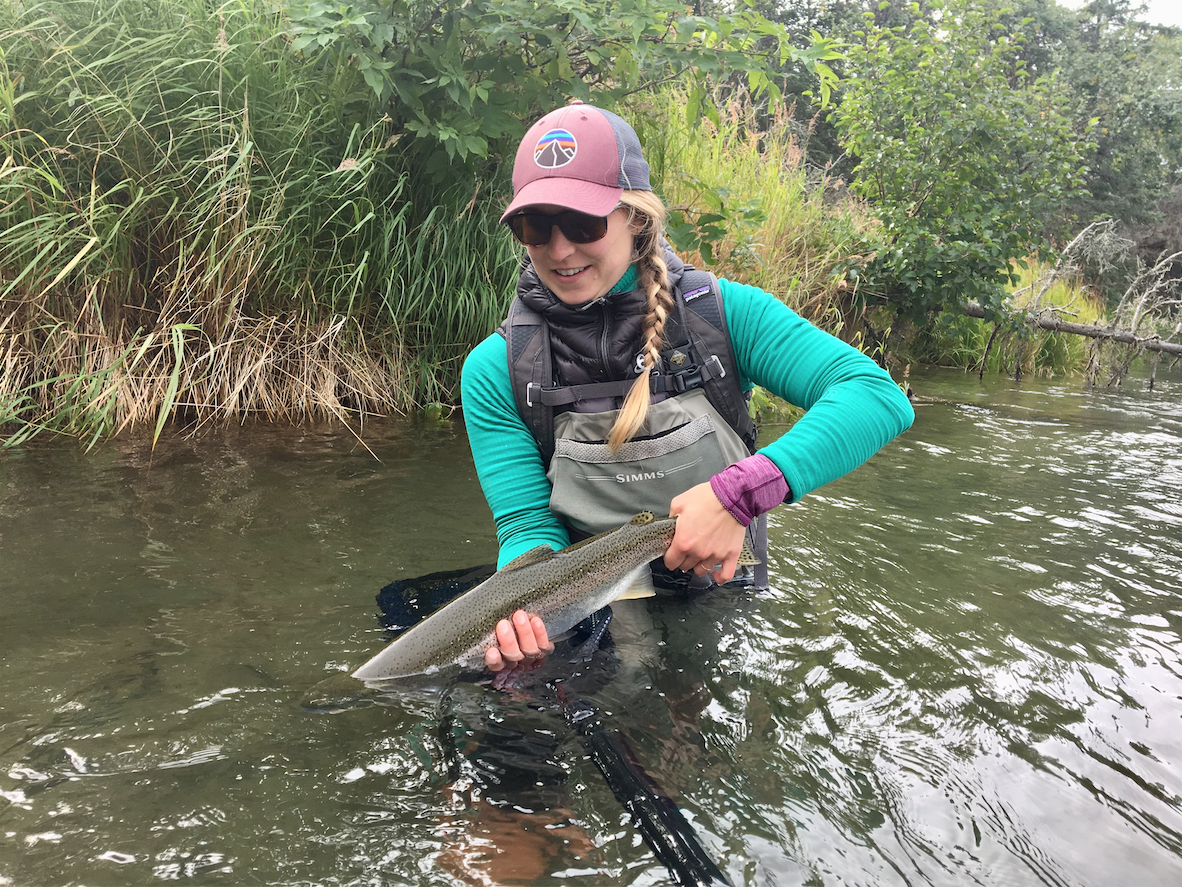By Jenny Weis
“My boyfriend didn’t teach me that!” was the way I indecorously retorted when a guide complimented my cast, saying, “Dang, your boyfriend must have been giving you some tips.”
He meant no harm. But I’d known how to cast long before I met my boyfriend. My friend Nanci taught me years prior, and Nanci knows a thing or two about fishing—she’s guided for more than 30 years in Bristol Bay.
Though he meant it as a compliment, it was the assumption that my guide/boyfriend must have taught me those skills that bothered me. Still, when I re-told that story to my friends, I described the cast (which was tricky… it needed to land under a low hanging tree on the far side of the stream, while avoiding a log jam not far to the right) as “lucky,” and that I, “somehow managed” to get it in the right spot as he and other clients looked on.
Then I heard other experienced-angler ladies doing something similar, and the shared lack of stated confidence bothered me. Were we using those words because we’re just new and it really was luck? Or did we say it that way because we’re young women experiencing firsts in a sport dominated by men?
I remember back when I started running. I ran, slowly, multiple times a week. It wasn’t pretty. But I did it, and I did it very regularly. Eventually, I ran my first half marathon, very slowly and un-prettily. A couple days later, I was taken aback when someone referred to me as “a runner.” Runners are tall, skinny and fast, though. So, I definitely wasn’t one of those.
Of course, over time, I’ve learned and proved to myself (and hopefully others!) that the “runner” label means only one thing: you run. So, I am a runner.
The struggle has repeated itself with the “angler” title for me, and many women and others new to the sport. I regularly hear myself and lady friends saying their good casts were surprising, or undercutting what we’ve learned by saying, “I don’t really know what I’m doing,” though we’ve been fishing for years.
I recently made a conscious effort not to do that anymore. I hope any self-doubting ladies or uncertain newcomers out there will join me. It’s pretty simple. If you fish, you’re an angler. There are a million things to know about fly fishing: what kind of rod and reel to buy; what kind of tippet to use, WTF “tippet” even is; what kind of fly to use; how and where to cast said fly; how to get the fish in, how to safely handle said fish, etc, etc.
Eventually, people become experts on answering these questions (and hopefully sharing them with newcomers) for their home waters. But no one knows the answers to them everywhere. Everyone had to learn and be new at some point.
I’m inspired by Orvis’ 50/50 on the Water Campaign and Trout Unlimited’s efforts along the same lines. I’m also inspired by some female guides who are getting other ladies into the sport and showing male clients that women can be incredible guides and anglers.
But I’m also no stranger to the overwhelmed feeling of having so much to learn in a sport dominated by men and feeling like all eyes are on me and not wanting to suck. I’ve learned a lot, and I hope others push through the somewhat intimidating early period and do the same. (For what it’s worth, the guide/boyfriend of mine says ladies usually take instruction better than men and wind up improving way faster anyway. Wink, wink).
Having recently navigated the tribulations of being both new and female, I encourage ladies to ask questions and celebrate, not undercut, their victories. I encourage seasoned anglers to lend a hand and remind newcomers that they were new once, too.
I sat on a couch in the great room of a lodge late this summer and was the only female in the room full of older men. I listened quietly to them talking about the biggest rainbows they’d caught throughout the week, with a satisfactory smirk that my second and third largest catches of the trip would’ve bested theirs in the polite yet routine, “whose fish is bigger?” competition they were having. They didn’t ask me, and I didn’t mind keeping it to myself.
But I’m cool with being called an angler now, and can’t wait for more and more ladies to join me in that. And also for them to join me in the smirking over our success.
Jenny Weis is the communications director for TU’s Alaska Program. She lives and works in Anchorage.



